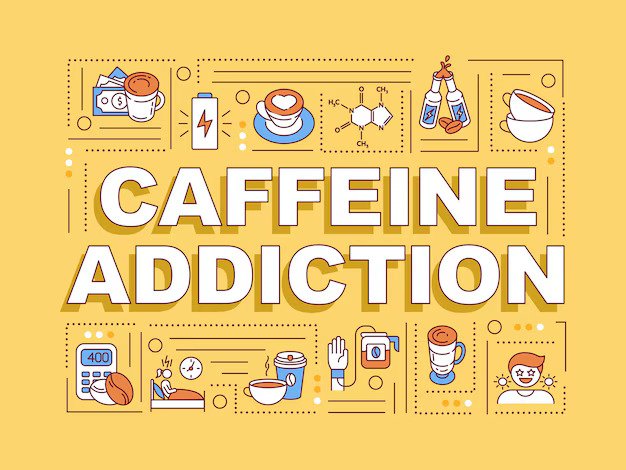Caffeine addiction refers to a dependency on caffeine, a natural stimulant found in coffee, tea, energy drinks, and certain medications. When consumed regularly, caffeine can alter brain chemistry, leading to physical and psychological dependence. Symptoms of caffeine addiction may include headaches, fatigue, irritability, difficulty concentrating, and cravings for caffeine. While moderate caffeine consumption is generally safe for most people, excessive intake can lead to health problems and interfere with daily functioning.
Is caffeine addiction good for the body?
Caffeine addiction isn’t good for the body. While moderate caffeine intake has potential benefits, addiction can lead to downsides. With dependence, you might experience withdrawal symptoms like headaches and fatigue if you don’t get your fix. Sleep can be disrupted, and anxiety or jitteriness can arise. It’s best to consume caffeine in moderation and listen to your body to avoid negative effects.
How to Break Caffeine Addiction Quickly and Easily?
If someone is struggling with caffeine addiction and seeking professional help, consulting the “Best psychologists in India” can aid in their healing journey.
- Set a Clear Goal: Determine why you want to quit caffeine and set a specific goal for yourself.
- Gradual Reduction: Reduce your caffeine intake gradually over several days or weeks to minimize withdrawal symptoms.
- Track Consumption: Keep a journal to track your caffeine intake and gradually decrease it each day.
- Hydrate: Drink plenty of water to stay hydrated and flush out toxins from your system.
- Replace with Alternatives: Substitute caffeinated beverages with herbal teas, decaf coffee, or other non-caffeinated drinks.
- Avoid Triggers: Identify and avoid situations or places that trigger your caffeine cravings.
- Get Enough Sleep: Ensure you’re getting enough sleep each night to help combat fatigue and reduce the need for caffeine.
- Practice Stress Management: Use relaxation techniques such as deep breathing, meditation, or yoga to manage stress without relying on caffeine.
- Healthy Diet: Eat a balanced diet rich in fruits, vegetables, and whole grains to support overall well-being and reduce the need for caffeine as an energy boost.
- Limit Evening Consumption: Avoid consuming caffeine in the evening to promote better sleep quality.
- Seek Support: Share your goal with friends or family members for accountability and support during the quitting process.
- Use Caffeine Alternatives: Experiment with alternative ways to boost energy, such as taking short walks, listening to energizing music, or chewing gum.
- Manage Withdrawal Symptoms: Be prepared for withdrawal symptoms such as headaches, irritability, and fatigue, and use over-the-counter pain relievers or other remedies as needed.
- Stay Busy: Keep yourself occupied with activities and hobbies to distract yourself from cravings and withdrawal discomfort.
If caffeine is becoming a coping mechanism for emotional struggles like depression or anxiety, consider discussing treatment options with your physician, while “Addiction counselling” can offer valuable support and encouragement.
What are the side effects of caffeine addiction?
Caffeine addiction can lead to various side effects, both short-term and long-term. Here are 16 potential side effects:
- Insomnia: Difficulty falling asleep or staying asleep due to caffeine’s stimulant effects.
- Increased Heart Rate: Caffeine can cause a rapid heartbeat or palpitations, especially in sensitive individuals.
- Digestive Issues: Excessive caffeine consumption may lead to digestive problems such as acid reflux, stomach upset, or diarrhea.
- Anxiety: Caffeine can exacerbate feelings of anxiety or nervousness, especially in high doses or in individuals prone to anxiety disorders.
- Jitters and Tremors: Excessive caffeine intake can cause tremors or shaking hands, known as caffeine-induced jitteriness.
- High Blood Pressure: Long-term consumption of large amounts of caffeine may contribute to elevated blood pressure, increasing the risk of cardiovascular problems.
- Headaches: Withdrawal from caffeine addiction can trigger headaches or migraines, especially if consumption is suddenly stopped.
- Dehydration: Caffeine is a diuretic, which means it increases urine production and can lead to dehydration if not compensated by adequate water intake.
- Dependency: Regular consumption of caffeine can lead to physical and psychological dependence, making it challenging to function without it.
- Decreased Bone Density: Some studies suggest that excessive caffeine intake may interfere with calcium absorption, potentially leading to decreased bone density over time.
- Muscle Tremors: Prolonged caffeine use may cause muscle twitching or involuntary muscle movements.
- Increased Risk of Miscarriage: High caffeine intake during pregnancy has been associated with an increased risk of miscarriage or low birth weight.
- Addiction Transfer: People with caffeine addiction may be more prone to developing dependencies on other substances or behaviors.
- Interference with Medications: Caffeine can interact with certain medications, either reducing their effectiveness or increasing their side effects.
- Impaired Sleep Quality: Even moderate caffeine consumption can disrupt sleep patterns, leading to poor sleep quality and daytime drowsiness.
conclusion
It’s important to note that individual sensitivity to caffeine varies, and not everyone will experience all of these side effects. However, being aware of the potential risks associated with caffeine addiction can help individuals make informed choices about their consumption.




